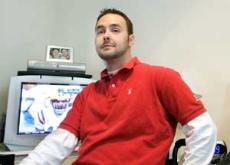The cool, flat surface of the pool felt different that night. A place that seemed like home suddenly became alien to him. Though his body had felt the water’s comforting embrace a thousand times before, this feeling would stick in his mind for the rest of his life.
That night — Aug. 10, 2003 — Justin Richardson, a senior in political science, broke his neck in a diving accident at the Trinity Commons apartment complex’s pool. Richardson and his friends were out celebrating his brother’s birthday when they decided to come back and go for a swim at about 4:30 a.m. Richardson, who was drunk at the time, dove into the shallow end of the pool and hit his head on the stairs, breaking his neck.
“I partied my tail off in high school and college and I had a good time,” Richardson said. “But the irony of my accident is the fact that I was a competitive swimmer. I ran a lifeguard company. I had 120 lifeguards working for me … I instructed lifeguards and I was a certified pool operator. I was the last person that was supposed to happen to, just the absolute last.”
That night Richardson said the alcohol had a major influence on him.
“I was out there and I had been drinking and my blood alcohol level was high … you start drinking and you think you’re Superman,” he said.
After living in Israel for six weeks while undergoing extensive surgery during the fall of 2003, Richardson began the next stage of his life in a wheelchair. Learning to operate without the use of his legs was demanding, he said.
During recovery, Richardson got his touch sensations back first, then his hot-and-cold sensations.
“There are certain areas of my body where I feel hot and cold, but I can’t feel pain,” Richardson said.
These sensations were the best part of his recovery, according to him.
“For your family to be able to touch you, or somebody you’re dating to be able to just lay there and touch you …” Richardson said. “I know it sounds like something you take for granted, but I’d go back to Israel just to get the touch back.”
Following rehabilitation in Denver, Colo., Richardson started attending classes at N.C. State during the summer of 2004. He experienced mixed emotions about how people would view him now that he was dependent on a wheelchair.
“That was just terrifying — not knowing how people were going to react. You don’t see a lot of kids running around in wheelchairs on campus,” Richardson said.
Another worry that haunted Richardson throughout his recovery was his ability to play sports.
“I was very athletic. I was a competitive swimmer and I played soccer my whole life,” he said. “To go from being in really good shape and taking care of yourself to not being able to use half of your body … that’s frustrating beyond words.”
But Richardson overcame that obstacle. In March he started playing for the Raleigh Sidewinders quadriplegic rugby team, sponsored by the North Carolina Spinal Cord Injury Association. The Raleigh-based association helps to advocate governmental funding for stem cell research and other research that might cure paralysis
Before the accident, Richardson was not just physically active, but he said he also dated actively. But despite what he expected, Richardson said he experienced little change in his social life. When it comes to relationships, he said he is looking for an “understanding partner, willing to be creative,” he said.
His friends and family, according to Richardson, have always been supportive of him. He said during the hardest times when he was experiencing the most pain, his family wouldn’t let him feel sorry for himself.
“I never hit that depression stage. And I know I’m only three years out, but I feel pretty strongly that I most likely won’t,” Richardson said.
Richardson’s brother Mark, an UNC-Chapel Hill alumnus, was present the night of the accident.
“The person inside of Justin is almost exactly the same as before,” Mark said. “I’m just so impressed with how independent he is right now.”
When spending time together with his family members, Richardson doesn’t limit their options. Instead, Mark said they ask “What can we do that’s going to involve everybody.”
Richardson’s mother, Sandra, said she was worried about Richardson’s future.
“He’s always done very well dating,” she said. “I would like for him to have the opportunity to have children.”
Sandra said her son has proved he is responsible enough to be trusted in the real world, even if he does have a disability.
“I wish there was some way to go back and change it. But there is really no point in beating ourselves up over it,” She said.
Sandra said she does worry for him because “he pushes himself too hard.”
Within these few short years, Richardson said he has been involved politically with spinal cord injury research.
“I got a chance to speak on Capitol Hill with Hillary Clinton and Dana Reeve before she died,” he said.
The North Carolina Spinal Cord Injury Association recently asked Richardson to serve on the board of directors.
Getting involved is how he shows his support, and Richardson said he is not giving up yet.
“I feel strongly that I will walk again,” Richardson said. “And I don’t think that’s a pipe dream … I’ve just got to wait it out.”








